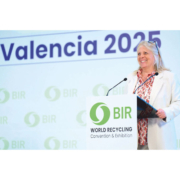BIR’s Position Paper on Chemical Recycling
Mechanical recycling must take priority and be incentivized.
Chemical recycling needs careful consideration and well-informed, market-based policies to ensure that it complements rather than competes with traditional recycling methods, the Bureau of International Recycling (BIR) stressed in its latest position paper published in April. According to the global recycling federation representing 37 national recycling associations and more than 950 individual companies, mechanical recycling must remain the preferred method on a large scale, whereas chemical recycling should be used only for hard-to-recycle end-of-life plastics. Describing chemical recycling as “a nascent technology”, BIR urges caution in its deployment and calls for the introduction of a harmonized definition of chemical recycling that excludes fuel production.
As pointed out in a press release, chemical recycling processes are extremely energy-intensive, and some that are currently available produce more greenhouse gas emissions than primary production using fossil fuels during the production process. “For these and other reasons, chemical recycling should be used only for materials that mechanical recycling cannot efficiently or economically process,” the Bureau of International Recycling referred to the position paper. Moreover, chemical recycling should not be allowed to override the need for design for recycling, the organization underlined. Policies should focus on eliminating hard-to-recycle plastics and incentivizing the design of plastics for reuse or mechanical recycling, thus reducing the requirement for new resources. In the position paper would be added that chemical recyclers should refrain from misusing mass balance accounting principles to fulfill recycled content objectives.
“A robust method for calculating the climate impacts of chemical recycling must be developed,” BIR Director General Arnaud Brunet was cited. “This should cover all emissions from the process, as well as overall energy usage and incineration of recovered hazardous waste. Furthermore, incentivizing the lower-carbon option of mechanical recycling would enable it to compete with lower-priced primary plastics and make the process more attractive for investment.”
Also responding to the publication of this latest position paper, BIR President Susie Burrage OBE underlined the importance of conveying the industry’s key messages on issues relating to recycling. “I am delighted that BIR dedicates resources to such important topics. I’m also extremely appreciative of the excellent collaboration with our national associations on this. It is vital that we continue to join forces in this way for the benefit of our members.”
bir.org/publications/position-papers
(Published in GLOBAL RECYCLING Magazine 2/2024, Page 26, Photo: R_Yosha / stock.adobe.com)






